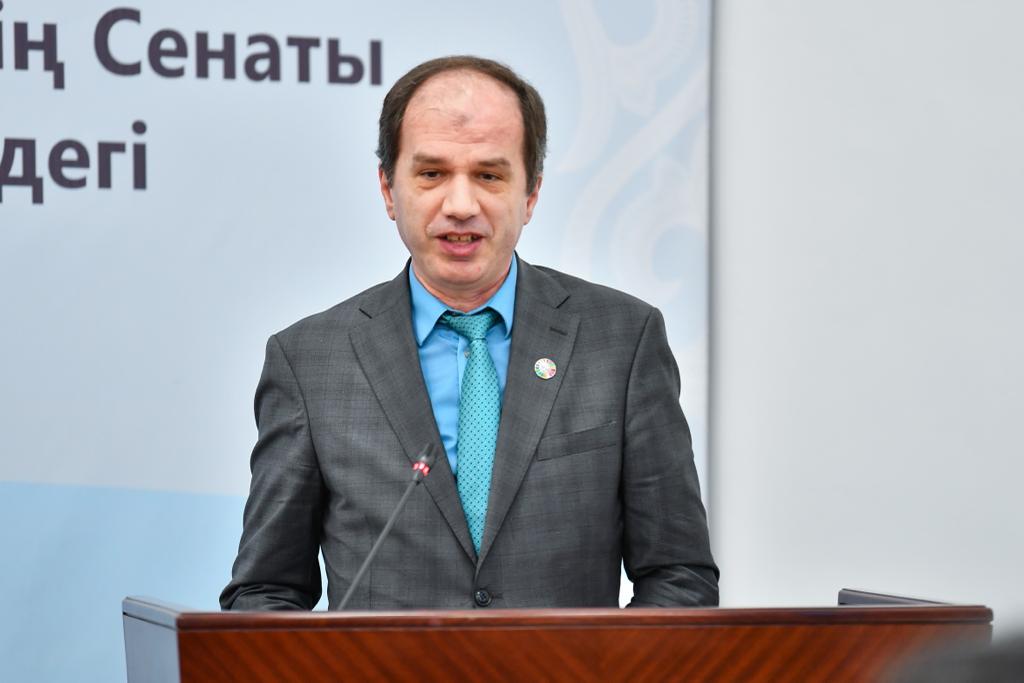Photo: Press Office of the Senate of the Parliament of the Republic of Kazakhstan
Asa kyrmetti Shakirov myrza, Safoyev myrza, Nalibayev myrza,
Distinguished Ministers, ladies and gentlemen!
It is my privilege to take part in the second meeting of the Cooperation Commission between the Senate of the Parliament of the Republic of Kazakhstan and the Oliy Majlis of the Republic of Uzbekistan.
The role of the Parliaments in the development of trans-border cooperation, especially on the issues of mutual concern such as the Aral Sea and its ecosystem, is indeed very high.
We all know, it is the world’s largest man-made disaster, that puts public health and well-being of more than 60 million people in Central Asian countries at risk. It also resulted in the desertification and degradation of the land resources, the deterioration of the biological diversity and significant social and economic losses for both countries.
For this reason, water management and governance have become a fundamental issue for governments. Over the years, both countries have engaged in major efforts within Central Asia to develop effective strategies and prompt interstate cooperation.
The prioritization of this issue and post-pandemic socio-economic recovery, in my view, fully represents the voices and concerns of people affected by this natural catastrophe on both sides. This has been also confirmed by the recent Voluntary National Review and Stockholm+50 stakeholder consultations, where Kyzylorda region people prioritized sustainable management of natural resources and ecosystems, climate, access to clean water, health and wellbeing, quality education and decent jobs for all.
Thus, we are here today to join efforts towards assuring sustainable development while conserving the environment and achieving a precise symmetry between economic and social development. Resilience building of communities across the region is a priority for both countries.
This would entail implementing comprehensive practical measures to restore the ecosystem at the local level in the most affected districts of Uzbekistan and Kazakhstan. This would also mean integrating green economy principles, addressing the social and economic aspects of the community’s resilience.
Thus, we understand that business ‘as usual’ is not an option. Today, we need to reinvent our development strategies to be able to develop with nature and to be able to invest in nature. Much more commitment is necessary to regulate water consumption and governance of local economic development.
For many years, UNDP has been a key partner of the Government of Kazakhstan in the issues of biodiversity and ecosystem conservation, promoting ecosystem-based strategies, that are more durable, cost-effective and can bring more co-benefits for local communities.
The atlas of functional zoning of the Aral and Kazalinsk regions, a geoportal for spatial monitoring of desertification and land degradation processes in the Aral region, 1.7 million planted Black Saxaul seedlings at the dry Arla seabed, a series of energy-efficient technologies that’ve helped farmers start growing less water-intensive crops are just a few examples of our sustainable ecosystem management approaches in the Aral Sea region.
We firmly believe that the green development approach here does not have to be just about cost. It should also be about social and economic development that fosters building resilient livelihoods.
Through our experience we have witnessed how green economy contributes to regional and local development. For example, our previous work on pasture flooding and seasonal grazing rotation interventions have rehabilitated 20,000 hectares of degraded pasture and increased livestock productivity in the region. The first phase of the Eco-Damu Loan Program (2015-2019) provided incentives for 39 green business projects near the Barsakelmes Reserve totaling 120 million tenge to support local communities.
Finally, we also see an integrated approach to local development as a critical element for the development of the Aral Sea region. It's been over 20 years since UNDP started helping the Aral Region regain its strength and livelihoods. Soon after UNDP began to work in the region, its initiative quickly became known as "Help the people of Aral help themselves” with an emphasis on raising competitiveness of the region through innovative approaches to regional planning and social services.
Under the current country programme, we have prioritised our work in the regions of Kazakhstan with our integrated development solutions. Designed and implemented in close cooperation with the regional akimats, they aim to address the specific socio-economic and environmental challenges of a given region.
To conclude, we at UNDP stand ready and committed to continue to share our best knowledge, expertise and practices to deliver economic, social, and environmental benefits for people and nature.
Thank you. Kop rakhmet.

 Locations
Locations



